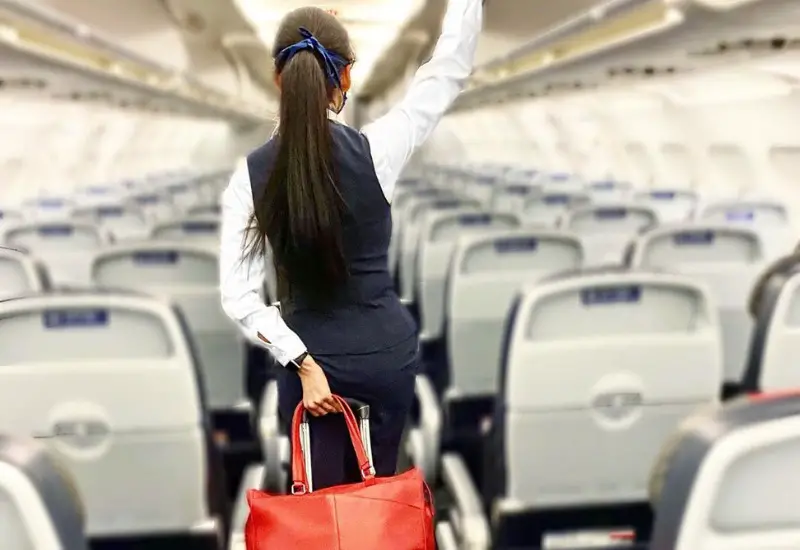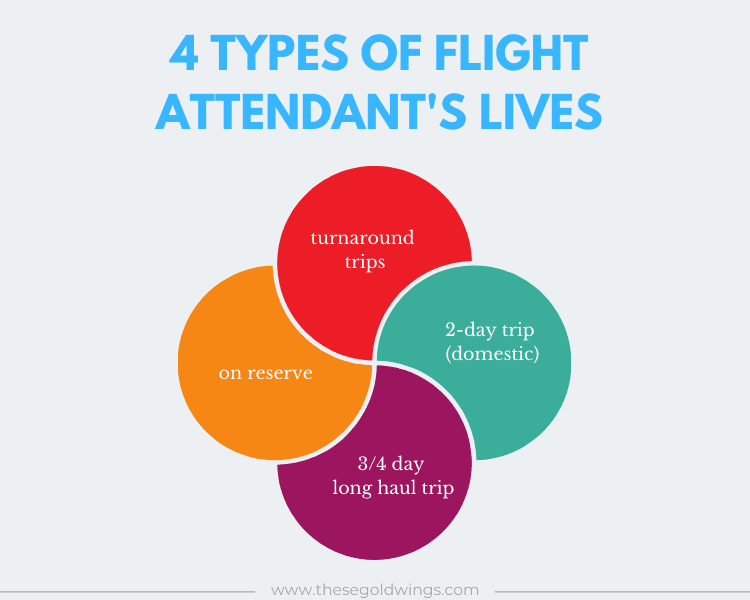
Flight Attendants are often viewed with this kind of wonder.
What is their life really like?
Well, I can tell you, it’s definitely not normal!
We lead a very nomadic life, that takes us away from home, for days at a time. A very real life on the road, so to speak.
I’ve been a flight attendant for over 10 years and in this article, I will go through what happens when you are gone for certain spans of time.
💡 Key Takeaways
- The life of a flight attendant is far from a typical 9 to 5 job – flexibility and a nomadic lifestyle are necessities.
- Flight attendants live out of suitcases, deal with constant time changes, but do get more days off than average jobs.
- Short turnaround “turn” trips start and end in home base in the same day, preferred by senior staff.
- Reserves never know their schedule and are on call, usually junior flight attendants work these less desirable trips.
- Two-day trips are most common and allow better crew camaraderie and layover options.
- Long haul international trips go to senior flight attendants but involve very long hours.
Table of Contents
Being a Flight Attendant Isn’t Your Average 9-5
When most people think about jobs, they think of a conventional nine-to-five job.
One with weekends and holidays off, where you are able to come home at the end of the night, and start all over the next day.
Well, being a Flight Attendant already breaks all of those rules.
1) Flexibility is a Must as Crew
You really have to be flexible when it comes to what you will be doing on a month-to-month basis, especially when you are a new Flight Attendant, with low seniority,
Understand that you could be away for some time, six days at a time, depending on if you back your trips up.
Say put a two-day trip next to a three-day trip.
During this time, you will either be working flights, or on a layover at the hotel in whatever city they have you staying in, for the specific trip.
Many times, if you are on reserve, you won’t even know which city you will be staying in, until they call you to work the trip.
In this case, you usually only know how many days you are good to the company, for them to call you out on a trip/trips.
When this happens, you really don’t know how many days you will be away from home, until they call and let you know.
You are truly at the company’s discretion.
2) Live Out of a Suitcase as Onboard Staff

You truly always have a suitcase packed, ready for the company to call and tell you where you are going, or packed for a trip you bid for. (A trip that you took the time, the month prior, to try to get).
You will be able to do this when you hold-a-line. A line is when you actually know your schedule for the month. This includes when you need to show up at the airport, what position on the airplane you are working, what day you are leaving, when you come back, etc.
Having a line gives you the ability to plan a little more, but this can still change due to cancellations, delays, etc.
You are truly all over the place.
In one day you can be in: Miami, Boston, and Seattle in one day.
3) Constant Time Changes Take Adjusting
One morning you are waking up on East Coast time, the next day you are waking up on West Coast time.
Or, you can be in one country one morning, and halfway across the world on another night.
I have had many occurrences where I wake up, and have no idea where I am, or what day it is.
Since your schedule fluctuates so much from month to month, figuring out what day of the week it is, is common.
4) More Days Off Than the Average Job
We are lucky in the sense that we do get more days off than normal jobs.
For myself, on a reserve month, one where I am at the discretion of the company, I get 12 days off.
However, on a line month, one where I know what I am doing, I typically have anywhere from 12-17 days off.
It really just depends on what I put in for, what I get, and how much I want to work.
We are able to pick up trips on our days off, as long as it falls in the parameters of the legalities we have to follow.
This is all part of the contract each airline has for their employees, as well as Federal Aviation Regulations.

Life of a Flight Attendant on a Turnaround Trip
What is a Turnaround Trip?
In the industry, a trip that starts in your base (where you start and end your trips) and ends back in your base is called a “turn”.
You start in base, take a flight to a designated location, and fly back.
This is the closest you can get to a normal “nine-to-five” job, but you just happen to be flying to multiple states/countries while doing it.
Example
- Start time is 7:08 am in Dallas, TX
- You are going from Dallas to Seattle, Seattle back to Dallas
- Ending time 6:03 pm back in Dallas, TX
- Dallas-Seattle, Seattle-Dallas
Who Usually Works Turns?
A lot of Flight Attendants who only work turns are either very senior, they don’t want to be away from home anymore. Or, they have children at home and need to be back the same day.
Of course, this isn’t always the case, but it is more typical to be working a two-day (working for two days straight), or a three-day trip.
Do Flight Attendants Like Turns?
I like turns, for the simple fact that you get back the same day, but if I am going to be working, I would rather get it out of the way and fly as many hours as possible, and then have a lot of days off in a row afterward.
When you are on standby (reserve), you don’t have a choice, you get what they give you.
On a line, however, you can put in for your preferences.
Also, with turns only going from your base, and back, you really don’t get to know your crew very well.
You work those two flights together and then call it a day.
This can either be wonderful, or sad.
If you like the crew, you really want to stay working with them.
If it is a bad crew, where there is someone you really don’t get along with, or the entire crew is horrible, you can’t wait to get back home and never see those Flight Attendants again. Or, so you hope!
Life of a Flight Attendant on a 2-Day Trip (Domestic)
What Is a 2-Day Trip (Domestic)?
A two-day trip is exactly as it sounds.
You are working for two days, domestically (for me domestic would be the United States).
These trips, as well as three-day trips are the most common trips you will see most Flight Attendants working.
Example
First Day:
- Sign-in time: 13:55
- Going from DFW (Dallas) to PHL (Philadelphia)
- Sit time in Philadelphia (time in between flights) is 4 hours and 18 minutes
- Then work PHL (Philadelphia) to MCO (Orlando)
- The flight lands at 23:37
- Laying over in Orlando for 12 hours and 49 minutes
Second Day:
- Flight going out of MCO (Orlando) at 14:58 to CLT (Charlotte)
- Sit time in Charlotte (time in between flights) is 3 hours and 35 minutes
- Then work CLT(Charlotte) back to DFW (Dallas)
- Ending the trip at 21:47 back in base, which is Dallas
Who Usually Works 2-Day Trips?
The vast majority of Flight Attendants will work two-day and three-day trips.
These are just the most frequent in the bid packet (what comes out for Flight Attendants to see what trips are going to be flown the next month, these trips are what we bid for).
The better the two-day trip, the higher the seniority usually.
Each Flight Attendant has their own preferences.
For myself, I commute out of Denver, so I try to bid for trips that have a layover at home in Denver.
That way I can spend more time at home, and less on the road.
Does this always work out?
No.
It just depends on who wants the trips you want.
The most senior person is going to get it.
Others want short layovers, so they can fly high-time trips and be back home as quickly as possible.
There are trips out there for everyone.
Do Flight Attendants like 2-Day Trips?
It really just depends on the Flight Attendant and what they are going for.
I personally like two days.
They are not too short, but not too long.
If I don’t get along with my crew I don’t really have all that much time with them.
You can also get some really nice layovers on two days.
I prefer the long layovers, so I can go out and explore, but again, just depends on what that specific Flight Attendant is going for.
Life of a Flight Attendant on a 3/4 Day Long Haul Trip
What Is a Long-Haul Trip?
A long-haul trip is what it sounds like, a trip that has to go a long way.
An example would be DFW (Dallas) to PVG (Shanghai, China).
This trip is going to cover a long distance.
Related topic: Short-Haul vs. Long-Haul Flight Attendant Life
This will turn it into a three-day trip (you will be away from base for three days), due to the amount of time the flight crews will be working on the planes.
There are specific rest legalities that the airlines must follow.
Example
First Day:
- Flying from DFW (Dallas) to PVG (Shanghai, China)
- Flight time: 14 hours and 30 minutes
Second Day:
- Remain in Shanghai, China for 24 hours
- This is from when you land, to when you fly again
Third Day:
- PVG (Shanghai, China) to DFW (Dallas)
- Flight time: 15 hours and 55 minutes
Who Works 3/4 Day Long-Haul Trips?
Three-day trips are very common for Flight Attendants to work, but there is a difference when it comes to long-haul domestic, and long-haul international.
The domestic routes are easier to get when you are a junior Flight Attendant.
Not always the case, but for the most part, you will get these if you bid for them.
However, long-haul international trips go to the super senior Flight Attendants.
The reason for this being, they only have to work two flights, they get 24 hours in an international location, and they are usually trips that pay exceptionally well (international pay as well).
Even though they have to work long flights, most Flight Attendants only have to do a trip like this a few times a month and they can have the rest of the time off.
It really is the best option if you want to get a lot of hours, and not work very many days.
The nice thing about these trips is you have the opportunity to see another country!
If you’re going to be away from home, you might as well pick a place where you can enjoy yourself.
Get out there and really see what the world has to offer.
You’re being paid to work the flight, your hotel is covered, you’re getting per diem for food expenses… Truly, what else could you want?
Do Flight Attendants Like Long-Haul Trips?
Honestly, some say yes, and some say no.
Every one of us has our own preferences.
I personally hate working long-haul flights, but I enjoy going to international destinations.
For others, long-haul flights are the only thing they want to do.
Again, this job really boils down to preference and what your seniority can hold.
Sometimes you really don’t have a choice, you get stuck with whatever they give you.
Then you have to try to trade, or drop trips to get what you wanted in the first place.
Life of a Flight Attendant on Reserve
What is Reserve?
Reserve is when you, as a Flight Attendant, are at the discretion of the company.
Some people can be on what we call “straight-reserve,” where they are good to the company consistently until they can hold a line.
A line is when you can bid for the trips you want, and you know what you are going to be working the next month.
A reserve Flight Attendant only knows their days off for the month.
After that, they can try to put in for certain things such as standby.
Standby is when you are sitting at the airport, in full uniform, for a specific amount of hours, waiting for the company to call you for a trip.
Then you can have something where you are on-call to the company.
On these days, you have certain hours (some you can be on-call 24 hours out of the day) where the company can call you at home and give you an assignment.
Essentially what I am saying is being on reserve is the most not normal scenario you can have.
You have no idea what you are going to be doing, until almost the last minute.
Example
An example of reserve would be:
- On-call from the 2nd-4th of May
- During these days I can be assigned standby shifts(at the airport), on-call shifts (at home), specific flight assignments
- Off of work from the 5th-6th
- On-call from the 7th-10th
- Same scenario where I can be assigned different situations
- Each airline gives their flight attendants a certain amount of days off per month, for individuals who are on reserve
Who Works Reserve?
At most airlines, the only employees who work reserve are the junior Flight Attendants.
- Some have where these Flight Attendants have to stay on reserve until a line opens up for them. Meaning a senior Flight Attendant retires or dies.
- Other companies, such as Delta, require all of their Flight Attendant to work a certain amount of reserve days a month. The rest of the time, they hold a line.
- Other companies have a rotating schedule, where based on the number of years flying will determine how many months out of the year you have to fly reserve. Example: one month on reserve, one month on a line.
Do Flight Attendants Like Reserve?
The honest answer is most definitely, NO!
I have yet to encounter a Flight Attendant who enjoys not knowing what they are going to be doing.
You truly have no life when you are on reserve.
You are unable to plan for anything.
This is another reason why seniority is so important in this industry.
The senior Flight Attendants look to the junior Flight Attendants to put in “their time.”It’s part of the initiation process I suppose. If you can withstand being on reserve for a long duration of time, you can truly handle anything.
Granted, you can get some of the best trips on reserve. Trips you wouldn’t be able to hold if you were on a line, due to your seniority.
This is the best part of reserve.
If you are lucky, you could be working a trip to places like Frankfurt, Germany, and get the opportunity to see a new country.
There are positives and negatives to reserve, but in my opinion, I just do not like not knowing what I am going to be doing for the month.
Most of us also prefer working a certain position on the plane, and when you are on Reserve, you can be working positions you really don’t want to be working.
Such as: the lead Flight Attendant.
Again, a matter of preference, but reserve really takes the cake on not being normal.
Your entire life revolves around the company’s needs.
Conclusion
Working as a Flight Attendant is truly an amazing career. It gives you the opportunity to really see the world, to interact with so many different individuals; passengers and coworkers alike.
However, with the ability to see the world, also comes being away.
Most of us really do lead a very nomadic life.
We are constantly on the go and can be away from home for a long duration of time.
If you are looking for the typical nine-to-five job, this is certainly not it.
Living a life out of a suitcase is for a very specific type of person, you quickly come to realize if it is for you.
I hope this article helped to answer some questions about the life of a Flight Attendant; and how it really is not normal!



